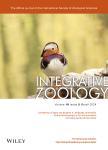Mixed-method study on medicinal herb collection in relation to wildlife conservation:the case of giant pandas in China
作者机构:Department of Wildlife Ecology and ConservationUniversity of FloridaGainesvilleFloridaUSA Key Laboratory of Southwest China Wildlife Resources ConservationChina West Normal UniversityMinistry of EducationNanchongChina
出 版 物:《Integrative Zoology》 (整合动物学(英文版))
年 卷 期:2019年第14卷第6期
页 面:604-612页
核心收录:
学科分类:090504[农学-特种经济动物饲养(含:蚕、蜂等)] 0710[理学-生物学] 0905[农学-畜牧学] 09[农学] 0906[农学-兽医学]
基 金:these grants:National Natural Science Foundation of China(41571517 31572293) Key Laboratory of Southwest China Wildlife Resources Conservation(China West Normal University),Ministry of Education,China(XNYB17-2).
主 题:Bayesian parameter estimation medicinal herb collection participatory mapping wildlife conservation
摘 要:Medicinal herb collection has historical and cultural roots in many rural communities in developing countries.Areas where herb collection occurs may overlap with biodiversity hotspots and crucial habitat of endangered and threatened species.However,impacts of such practices on wildlife are unknown and possibly underestimated,perhaps due to the elusive nature of such activities.We examined this phenomenon in Wolong Nature Reserve,China,a protected area in the South-Central China biodiversity hotspot that also supports a community of Tibetan,Qiang and Han people who use herb collection as a supplementary source of livelihood.We adopted a participatory approach in which we engaged local people in outlining spatial and temporal dynamics of medicinal herb collection practices.We found that the overall spatial extent of herb collection increased in the past two decades.We then overlaid herb collection maps with localities of giant panda(Ailuropoda melanoleuca)feces collected over two time points in the reserve.Using a Bayesian parameter estimation,we found evidence for declined giant panda occurrence in the areas most recently impacted by emerging medicinal herb collection.Our methodology demonstrates the potential power of integrating participatory approaches with quantitative methods for processes like herb collection that may be difficult to examine empirically.We discuss future directions for improving explanatory power and addressing uncertainty in this type of mixed-method,interdisciplinary research.This work has implications for future attempts to understand whether and how prevalent but subtle human activities may affect wildlife conservation.



